Written to a friend on the morning of New Year’s Eve:
“Right now I’m sitting under some coconut palms by a lake in Kerala. We have come here hoping to escape any New Year’s Eve madness, but we’ll be able to see fireworks from around the lake. It’s idyllic.”
Michael and I slipped away from Fort Cochin and its sparkling Christmas fun and accompanying crowds, which were clearly about to escalate for New Year. We came to Ashtamudi Lake, in Kollam. Here, the water laps to the end of the coconut treed garden, and a white heron, elegant as a model, stalks the little boat ramp. Our main fear is death by falling coconut as we lie in a hammock, swinging in the breeze. But the coconuts have all, thoughtfully, been plucked. A fish plops. A boatman poles his canoe.
For New Year’s Eve, we have bought a bottle of wine, to drink by the water at sunset. We talk. We are peacefully quiet. “Does not everything depend on our understanding of the silence around us?”, Lawrence Durrell has asked. Across the wide lake to one side is the bridge to Kollam, and a large white church from which, faintly, we hear a choir sing. An island promontory, thick with trees, reveals two low, terracotta roofed houses when their lights come on palely golden, rippling across the water. But what is that strange flashing that suddenly strifes the air?
A crash of very loud rock music booms out to our right, and searchlights climb across the lake, prompting Michael to remember the helicopters in Apocalypse Now. Around the curve of the land, very near but out of our view, is a large hotel, with houseboats moored in front. Apparently it is having a Big New Year Party. It is impossible to understand the pleasure for the party goers of the search lights, but it’s easy to see they are very annoying for everyone else. Swing, flash, crossover; now high in the sky, now low on the water, now focused on the little dwellings across the lake.
The party has begun early, just on sunset. There will, therefore, be at least another six hours of high energy celebration enveloping us from close by. But Prabhath, our host in this small resort, has arranged a special seafood dinner for the half dozen guests. There are platters of seared tuna, enormous tiger prawns, two different dishes of squid, small crabs (really too small to eat), a bowl of beetroot thoran, another of spicy brinjal, a cucumber salad, fresh pineapple. We eat with pleasure, talking with our fellow guests about their travels, and hear inexorably the party music, which mingles with more party music from far across the lake. This one, though, plays Indian film songs, which sound much more pleasant.
Occasionally, bursts of fireworks flower amber or red across the bay. Michael and I, finished with dinner and chat, return to our part of the gardens and lie in our chairs, looking up at the sky. Suddenly a spotlight seems to be trained on us from the lake directly in front, and grows larger and closer, with a man giving a speech over loudspeakers. It is not wartime invaders calling for surrender, however, nor is it an unexpected police raid – it’s swarming party people. The boat pulls into the little dock, and about thirty middle aged men pour affably into the grounds of Ashtamudi Villas, and begin relieving themselves around the garden. They are Prabhath’s friends, and the boat is the centrepiece of his New Year evening. We too had been invited aboard, but had declined.
After some time, the boat departs again, now also carrying Prabhath and a few guests, and I fall asleep blissfully under the fan, planning to wake later to see the fireworks across the lake. Near midnight, with the neighbouring music pounding on, the boat returns. The men alight in great spirits, shouting “Happy New Yar” many times over, and “Woo! Woo!” The boat, with its lights in front of us, makes it difficult to see out, but we do glimpse bursts of colour, sparkling somewhere in the distance. The neighbouring party also has fireworks, lit from a boat on the lake, and we can enjoy these, though not in the atmosphere we’d hoped for. The men from Prabhath’s party are rushing about still with more woops and shouts of excitement (“Happy New Yar, Woo, Woo!!”), preparing their own fireworks, which, set off under the trees here, are hidden by the canopy as they explode. The boatman hastily takes his vessel into the lake away from possible sparks. I wonder why there are no women or children in this party; it is strange to me, these adult men capering about with each other. How the children would love this shimmering (expensive) night show !
Eventually, the visitors return to the boat, which chugs off into the darkness. The neighbouring party continues frenetically, though the band takes a break now and then; the filmi music still drifts across the lake. Later, much later, it all winds down. There’s the water, and the breeze. My favourite lines from the poet Rumi –
“Out beyond ideas of wrongdoing
and rightdoing there is a field.
I’ll meet you there.
When the soul lies down in that grass
the world is too full to talk about.”
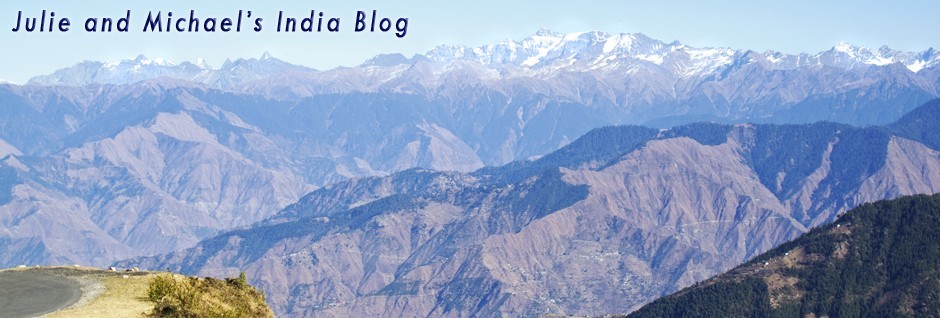
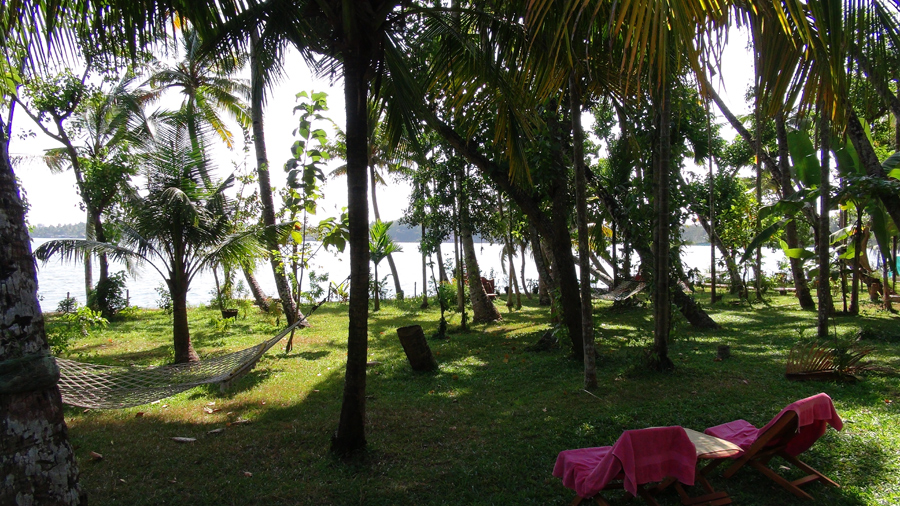
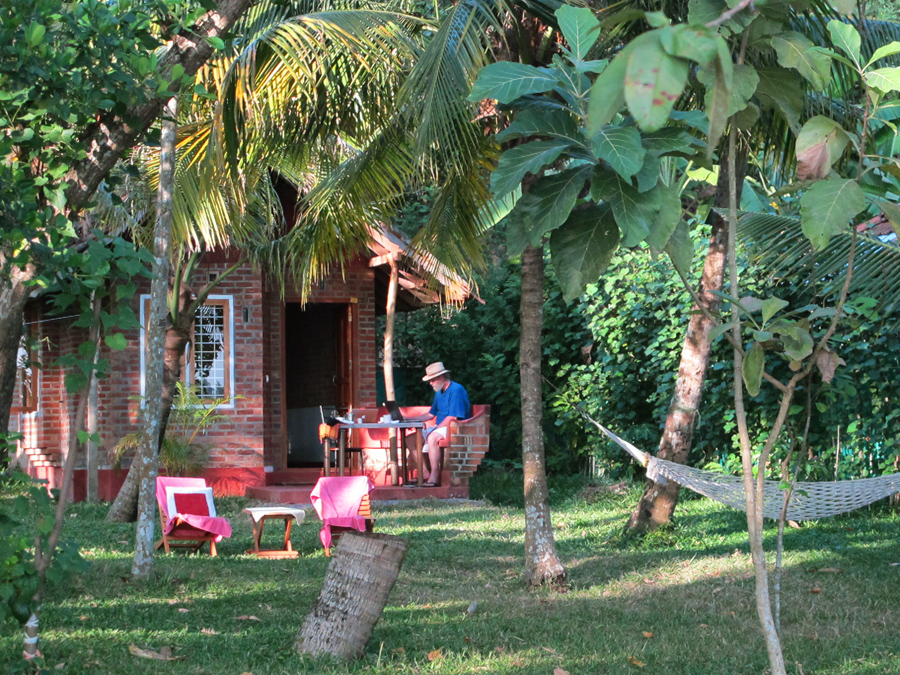
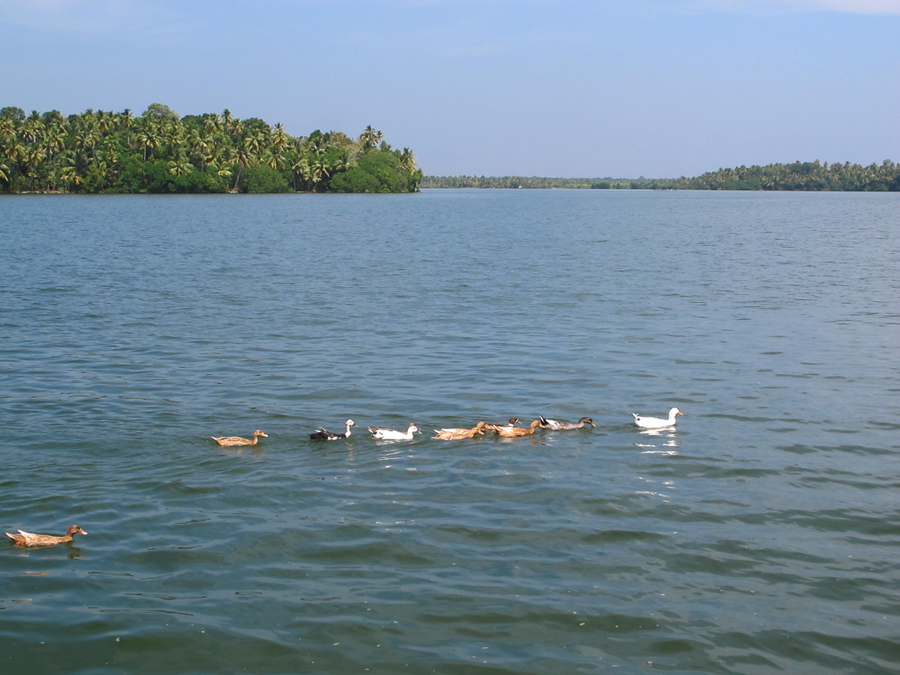
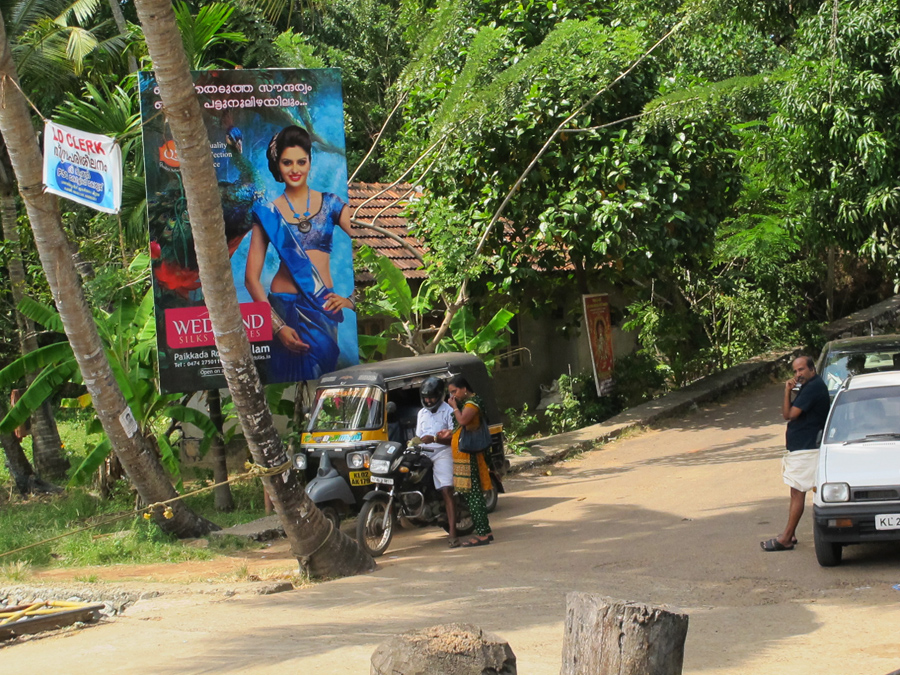
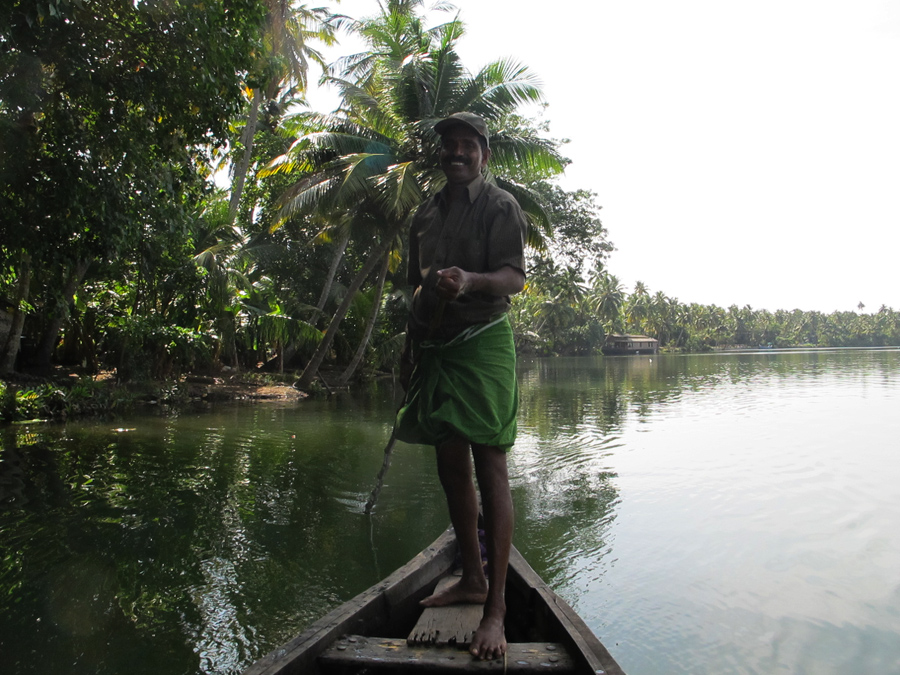
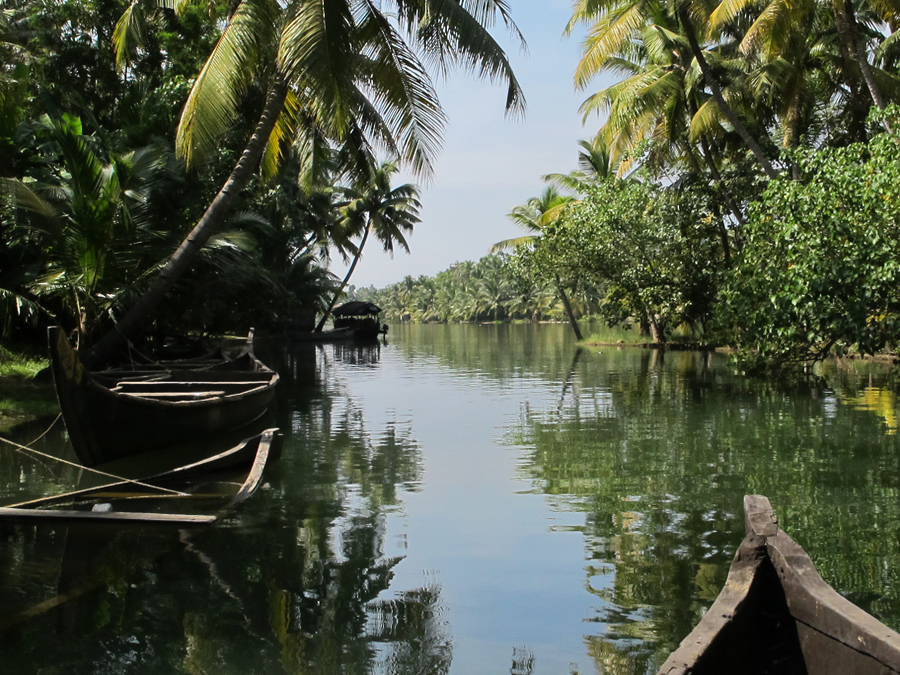
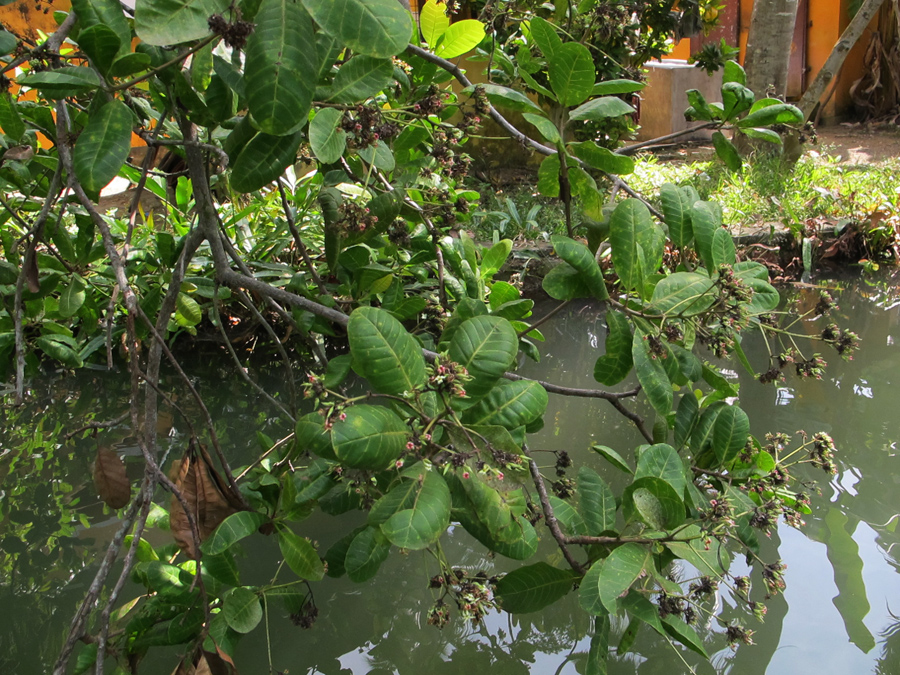
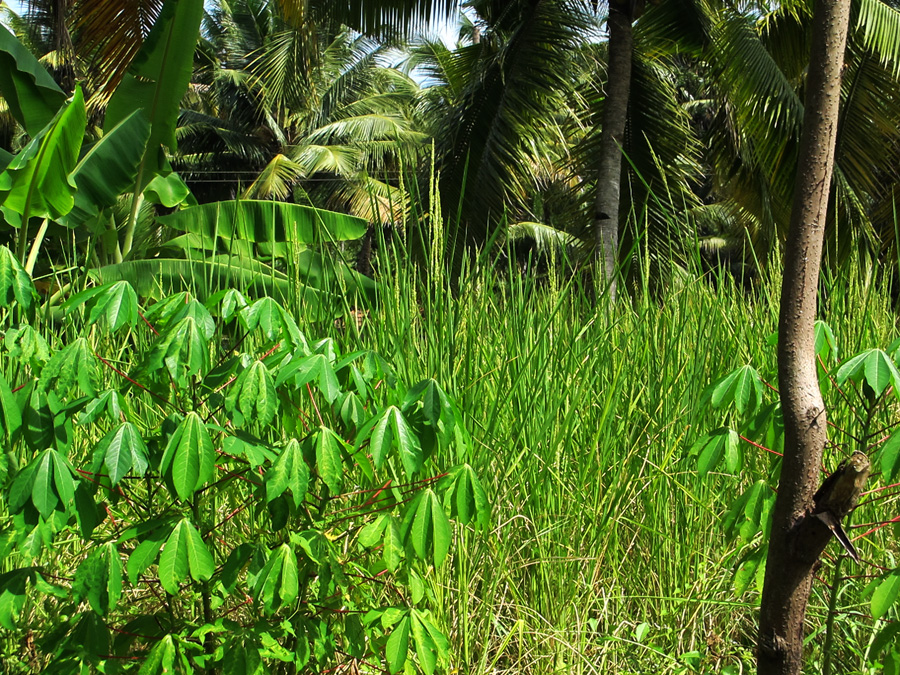
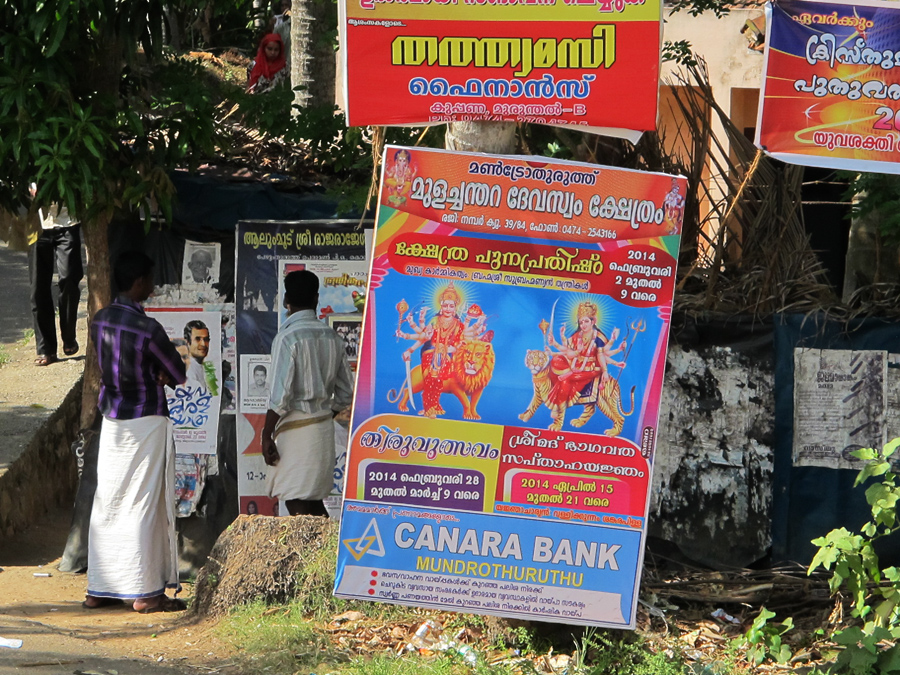
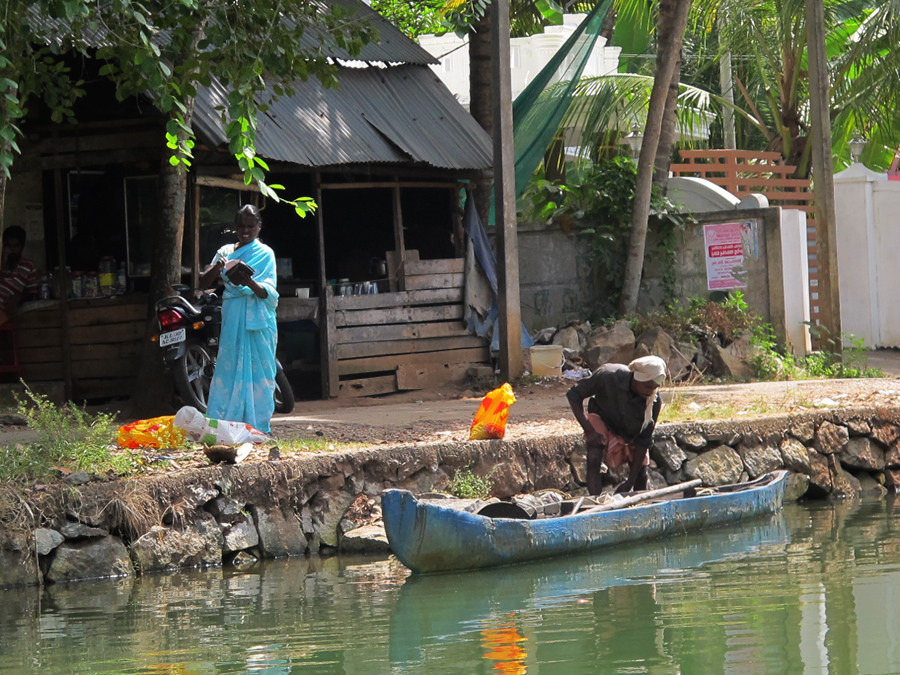
So often you both seem so at home in the idyllic accommodations you find. I think you should write more in-depth of them, but then am reminded how easily somewhere can become trendy and suddenly loose its innocence and charm. What a lovely place to spend new years and thank goodness someone had the foresight to disarm those coconut trees.
“Disarm” the coconut trees! Haha Tone, too true, they CAN kill people if they fall. There’s a very dangerous looking loaded one where we are staying now at the back of Kovalam Beach..and a jackfruit tree, what enormous fruit they are! Do you remember seeing them growing at Chinderah?
Actually, Michael writes reviews of the places we stay on Trip Advisor, which is also where we find many of these hotels and guest houses. So, too late, they already are known.
You really are in paradise, despite the perils of falling coconuts and water pollution. Your little cabin is so delightful, like something out of a fairy tale. And it’s made of brick! Such a surprise in such a hot land. I would have expected a grass hut on stilts.
Despite the noisy revellers, your New Year’s celebrations sound idyllic. One would never think you were in crowded, hot, polluted, noisy, over-the-top everything India.
There must be times you feel you have died and gone to heaven. Thank the goddess for Trip Advisor, even though it might doom such places to succumb to the “tourist disease” eventually. In China I was delighted to accidentally walk down an amazing street of calligraphy and painting shops that was NOT in the Lonely Planet. Thank the goddess for that too, as there were NO tourists there except us. The street was for them, for their calligraphy and art, and we were in their world, not they in ours.
Hi Joan. Yes, it was lovely there, though it was unexpectedly kinda noisy! Which is why I wrote about it 🙂 Some of those pictures are from a boat trip we took in a canoe through some nearby waterways.
Yes, the cabin was lovely. Many buildings here are made of cement ,and I guess the “better” ones are brick. There’s also a type of stone-like soil called laterite which is carved out into large bricks. They are both quite cool (at least, with a fan!!. I remember that Denis, in a lecture, once discussed why a particular civilisation had left so little remnants – it was because the buildings were made of wood. Of course in this humid South, I imagine wood would become termite riddled. Oh -but there is lots of old wood in the temples and palaces -perhaps hardwood rainforest timber. I’ll have to look into it!
You were fortunate to stumble into that calligraphy street in China. Some of the best things happen like that, unlooked for. I don’t mind other tourists ,though. In fact, I’m grateful for them and for comforts they have brought by their presence! As long as there aren’t too many, of course 🙂 I’m definitely NOT the explorer type as were some of those amazing European women travellers in Victorian times- Isabella Bird, Alexandra David-Neel, etc!